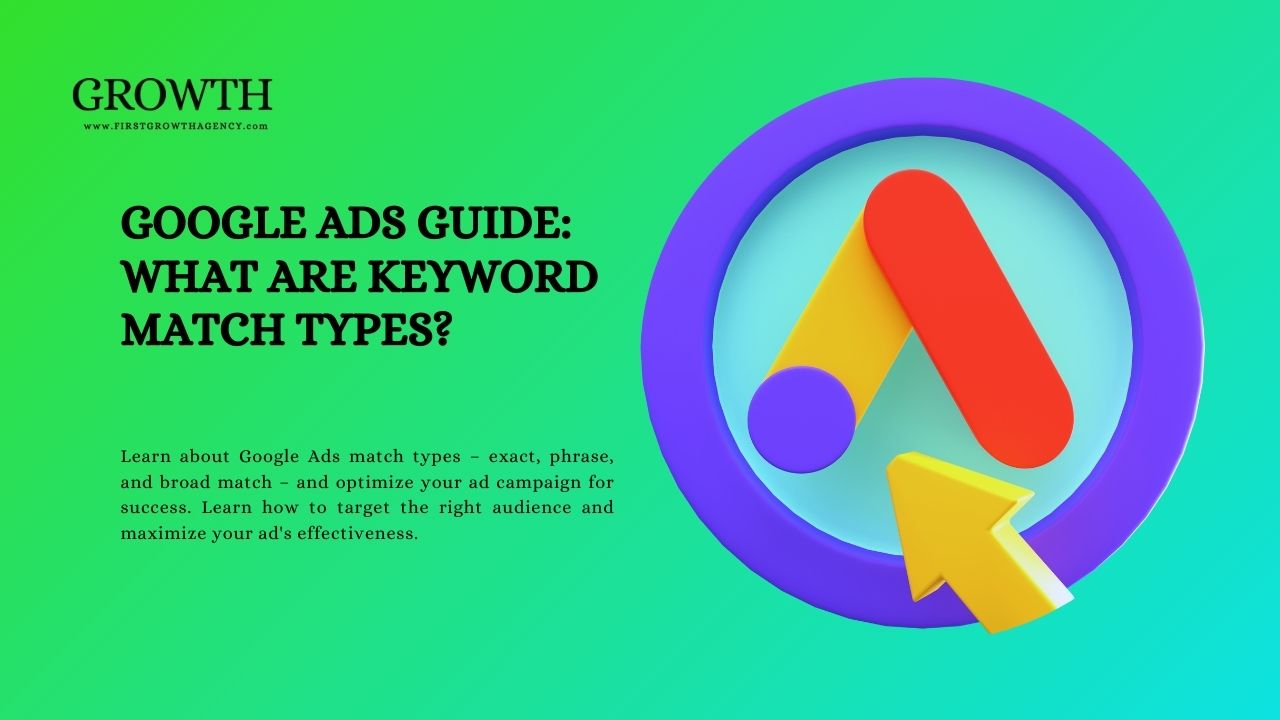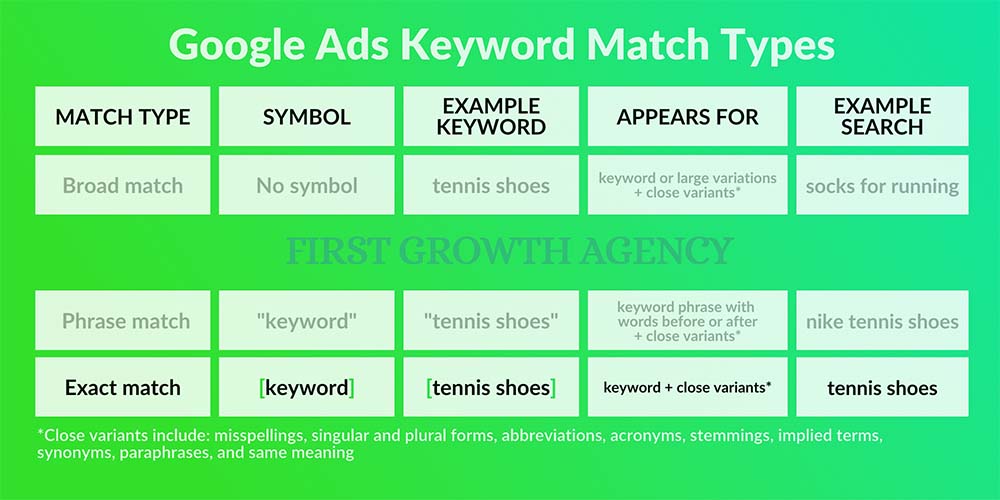To put up an ad on Google, you gotta pick the right keyword match type. This tells Google how much you want your ad to match what folks search for. There are three Google Ads match types: exact match, phrase match, and broad match.
Broad match shows your ad for searches linked to your keyword. Lots of people see it, but it might not always match exactly what they’re looking for. Phrase match puts your ad out there for searches that fit the meaning of your keyword. You get a decent amount of views that are pretty relevant. And Exact match pops up your ad for searches that exactly match your keyword. You might not get as many views, but the ones you do get are right on the money.
Check: What Is PPC? Learn the Basics of Pay Per Click Marketing in 2024 first.
Importance of Match Type Keywords
Keyword match types decide which searches will trigger your ads. It doesn’t affect your organic rankings, however. It only affects how many people will see your ads and how well they’ll relate to them. Different match types let you show up for similar searches or only exact matches. For instance, you must have seen Google giving you results that weren’t exactly what you typed in but still served the purpose. That’s because of how advertisers use different types of keywords and match types in Google Ads.
You gotta look at how your keywords have done before, what your competitors are up to, how much you’re bidding, and how you’ve set up your account. Advertisers often split keywords into different match types and write ads just for them. Doing this smartly helps you find the right customers without wasting money on clicks that don’t matter.
Understanding and using these Google Ads match types is key to a successful Google Ads campaign.
Check out: How Can Google Ads Help You Advance Your Business Goals
Broad Match
Broad search helps your ad reach lots of people. Your ad can show up if someone searches for any word in your key phrase, in any order. It also shows up for words related to your keyword. Imagine you’re promoting “men’s face wash” with broad matches. Your ad might show up if someone looks for “men’s cosmetics,” “men’s fashion items,” or even “face products for men” without using the exact words from your keyword.
This means your ads can find more people who might like men’s face wash. But, there’s a chance they might not be exactly what they’re looking for. That’s why Google suggests using broad match with Smart Bidding to only reach people who are into what you offer.
Smart Bidding uses AI to adjust your bids based on what it thinks will get you conversions. And like other keyword stuff, you only pay when someone clicks. But with broad match, your ads might fight each other if they use similar keywords. That’s called ad poaching. To fix that, try a good PPC Keyword Tool. It stops your ads from competing and hurting your performance.
Phrase match
With phrase matching, your ad pops up when someone types in the specific words you’ve chosen, even if there are other words before or after them. It includes words that mean the same thing, plurals, or words that are very similar to your original keyword. It’s a good way to make sure your ads reach the right people without showing up for everything under the sun.
So, if you’re aiming for “handcrafted coffee beans,” your ad might show up for “gourmet coffee beans nearby” or “organic coffee bean shops.” Or if your keyword is “best men’s face wash,” your ad might pop up when someone searches for things like “buy men’s face wash,”. But it won’t show up for things that are only sort of related, like “men’s face wash ingredients”.
Phrase match also helps your ad pop up when people search for stuff that’s related to your keyword. It’s like synonyms or similar meanings. People don’t have to type the exact words you bid on to see your ad.
It works well for brands with decent budgets. They let you experiment and gather data without burning through your budget too fast. They give you more control and can get you results early on, especially if you’ve done your keyword research right.
Exact match
Exact match keywords show up when someone searches for that exact word or phrase, or use synonyms, plurals, or other keyword variation. For example, if you pick the keyword “adventure travel experiences,” your ads will pop up for searches like “adventure travel tours,” “adventure travel destinations,” “unique adventure travel experiences,” and “adventure travel packages.”
Using exact match keywords gives you a lot of control over where your ads show up. It helps you figure out which keywords work and which don’t. That way, you might get more people to do what you want them to do, like buy stuff or sign up for things. Although exact match keywords are super precise, they might limit the number of places your ads can go and make each click more expensive.
Plus, it helps you save money and keeps your conversion rates high. But the downside is you might get less traffic because of the stricter rules. Since these specific searches usually aren’t searched as much, your ad might not show up as often. But still, starting with exact match keywords is good to start seeing results fast and tell Google exactly what you want.
Related: Search Engine Marketing (SEM): What It Is, and It’s Benefits
Optimizing Keyword Match Types in Google Ads
When you set up ads in Google, there are two ways to match different types of keywords. First, pick keyword match types in the Google Keyword Planner. Second, adjust match types as you create campaigns and ad groups. You can always change these settings later. Just go into your ad groups, find the keywords, and make your changes.
Wrapping Up
Knowing and using Google Ads match types is really important for a successful ad campaign. Broad match lets your ads reach lots of people, but you might need clever bidding tricks to make sure they’re relevant. Phrase match helps you be more specific, so your ads show up for the right searches even if the words are a bit different. Exact match is the most precise, showing your ads only for certain search terms, which could mean fewer clicks but might cost more.
Experts suggest mixing broad matches with targeting specific groups, like folks with particular interests or behaviors online. It makes your ads even more relevant. If your campaign has enough data, using smart bidding with broad match keywords can speed up your results a lot. Also, remember to bid higher on exact match keywords that perform well for you. At the same time, use cheaper broad match keywords to reach more people without spending too much money.
If you combine keywords with a good plan and use negative keywords well, you’ll get your ads in the right places and start seeing results. As we are one of the best Google Ads agency, we can help you figure it all out.
Check Digital Marketing 101: What is SEO, SEM, and SMM?, our beginner’s guide to get you started.




